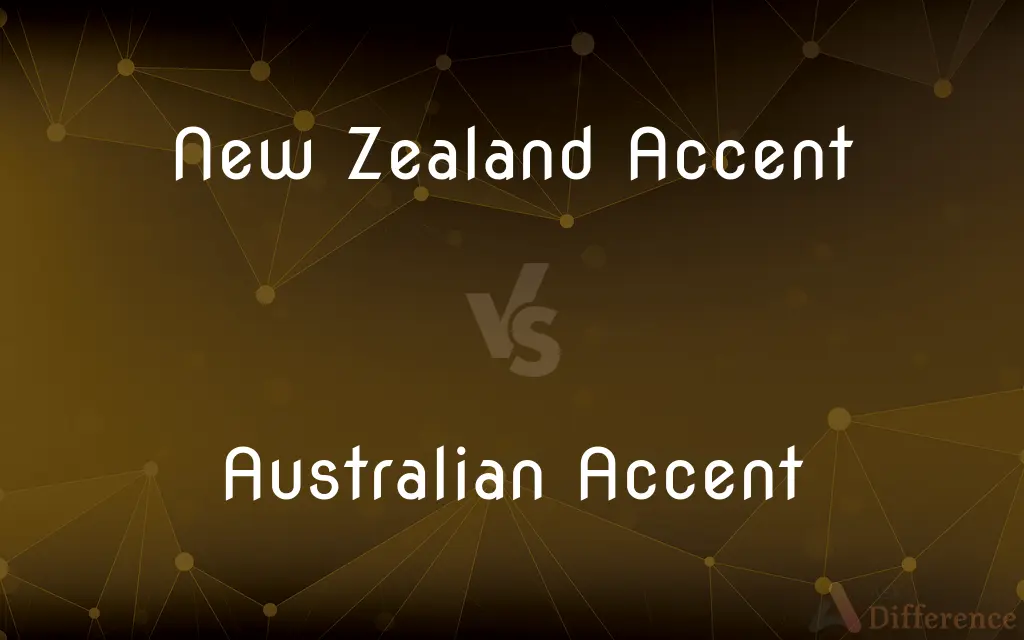New Zealand Accent vs. Australian Accent — What's the Difference?
By Urooj Arif & Maham Liaqat — Published on October 16, 2024
The New Zealand accent is characterized by its vowel shifts and soft intonations, while the Australian accent is known for its distinctive nasal quality and rising inflection.

Difference Between New Zealand Accent and Australian Accent
Table of Contents
ADVERTISEMENT
Key Differences
The New Zealand accent is often described as more rounded and softer in its vowel sounds. This is evident in the way words like "fish" sound closer to "fush." On the other hand, the Australian accent tends to be broader and has a more pronounced nasal quality, making their pronunciation distinctly different, especially in words like "no," which tends to sound more like "noe."
One distinctive feature of the New Zealand accent is the centralization of vowels, which means that vowels that are typically pronounced at the front or back of the mouth in British English tend to be pronounced more centrally. Whereas, in the Australian accent, there is a tendency for vowel elongation and diphthongization, which adds a twang to the speech that is recognizably Australian.
The intonation patterns of the New Zealand accent often involve a rise at the end of statements, giving it a slightly questioning tone. This contrasts with the Australian accent, which is characterized by a more varied intonation pattern that includes both rises and falls, contributing to its lively and expressive nature.
New Zealand English incorporates Māori words and phrases more frequently, reflecting the country’s bicultural heritage. In contrast, Australian English includes a range of Aboriginal words as well as slang that is unique to Australia, demonstrating its multicultural influences.
The speed of speech also differentiates these accents. New Zealanders generally speak more quickly, with a more clipped tone, while Australians tend to speak at a slightly slower pace, allowing for their characteristic vowel sounds to resonate more fully.
ADVERTISEMENT
Comparison Chart
Vowel Sound
Rounded, softer
Nasal, broader
Pronunciation Feature
Centralized vowels
Vowel elongation, diphthongization
Intonation Pattern
Rising intonation at end of statements
Varied intonation with rises and falls
Linguistic Influence
Incorporates Māori words/phrases
Includes Aboriginal words and unique slang
Speech Speed
Quicker, more clipped
Slower, more resonant
Compare with Definitions
New Zealand Accent
Characterized by rounded vowel sounds.
The way deck sounds like dick in the New Zealand accent is a subject of humor.
Australian Accent
Marked by a distinctive nasal quality.
The nasal sound of mate is iconic in the Australian accent.
New Zealand Accent
Features a questioning intonation.
Even statements can sound like questions due to the rising intonation.
Australian Accent
Exhibits varied intonation patterns.
The expressive rise and fall make the Australian accent lively.
New Zealand Accent
Incorporates Māori language.
Many New Zealanders use kia ora for greeting, showcasing the accent's unique intonation.
Australian Accent
Characterized by vowel elongation.
Words like no are stretched into a longer, more nasal sound.
New Zealand Accent
Speaks more quickly.
Their quick speech pace often surprises visitors.
Australian Accent
Utilizes unique slang.
Australians often say arvo for afternoon, highlighting their accent’s character.
New Zealand Accent
Known for its centralizing vowel shifts.
In the New Zealand accent, bed can sound closer to bid.
Australian Accent
Tends towards a slower speech pace.
The relaxed pace allows the distinct vowel sounds to stand out.
Common Curiosities
Can Australians and New Zealanders understand each other easily?
Yes, Australians and New Zealanders can understand each other easily despite the differences in accent.
What is a common misconception about the Australian accent?
A common misconception is that there is only one type of Australian accent, when in fact there is a range of accents across different regions.
How does the Australian accent differ from the New Zealand accent?
The Australian accent differs in its broader, nasal quality, and its use of elongated vowels and distinct slang.
Is the New Zealand accent the same everywhere in New Zealand?
While there is a general New Zealand accent, slight regional variations do exist.
Do the Australian and New Zealand accents have British influences?
Yes, both accents have British influences but have evolved distinctly over time due to local factors.
How important are intonation patterns in distinguishing these accents?
Intonation patterns are crucial in distinguishing between the New Zealand and Australian accents, affecting the overall rhythm and melody of speech.
Why do New Zealand accents sound like they're asking a question?
The questioning intonation is due to the rising tone at the end of statements, a characteristic feature of the New Zealand accent.
How has the Māori language influenced the New Zealand accent?
The Māori language has influenced the New Zealand accent through the adoption of Māori words and the pronunciation of place names.
How does the speed of speech impact the perception of these accents?
The speed of speech impacts the clarity and character of the accents, with faster speech often perceived as more clipped or brisk.
What makes the New Zealand accent unique?
The New Zealand accent is unique due to its rounded vowel sounds and the inclusion of Māori words, reflecting its bicultural heritage.
Can learning the local slang help in understanding these accents better?
Yes, learning local slang can significantly improve understanding and immersion in the culture associated with each accent.
Why might someone confuse the New Zealand and Australian accents?
Someone might confuse them due to their geographical proximity and shared linguistic roots, despite their distinct features.
Are there any specific words that highlight the difference between these accents?
Specific words, such as "fish" (NZ) and "no" (AU), can highlight the vowel sound differences between these accents.
What role does slang play in the Australian accent?
Slang adds a unique character to the Australian accent, reflecting the country's culture and history.
What is diphthongization, and how does it relate to the Australian accent?
Diphthongization refers to the combination of two vowel sounds within the same syllable, a feature that adds a twang to the Australian accent.
Share Your Discovery

Previous Comparison
Tarantulas vs. Spiders
Next Comparison
Snooker Table vs. Pool TableAuthor Spotlight
Written by
Urooj ArifUrooj is a skilled content writer at Ask Difference, known for her exceptional ability to simplify complex topics into engaging and informative content. With a passion for research and a flair for clear, concise writing, she consistently delivers articles that resonate with our diverse audience.
Co-written by
Maham Liaqat











































